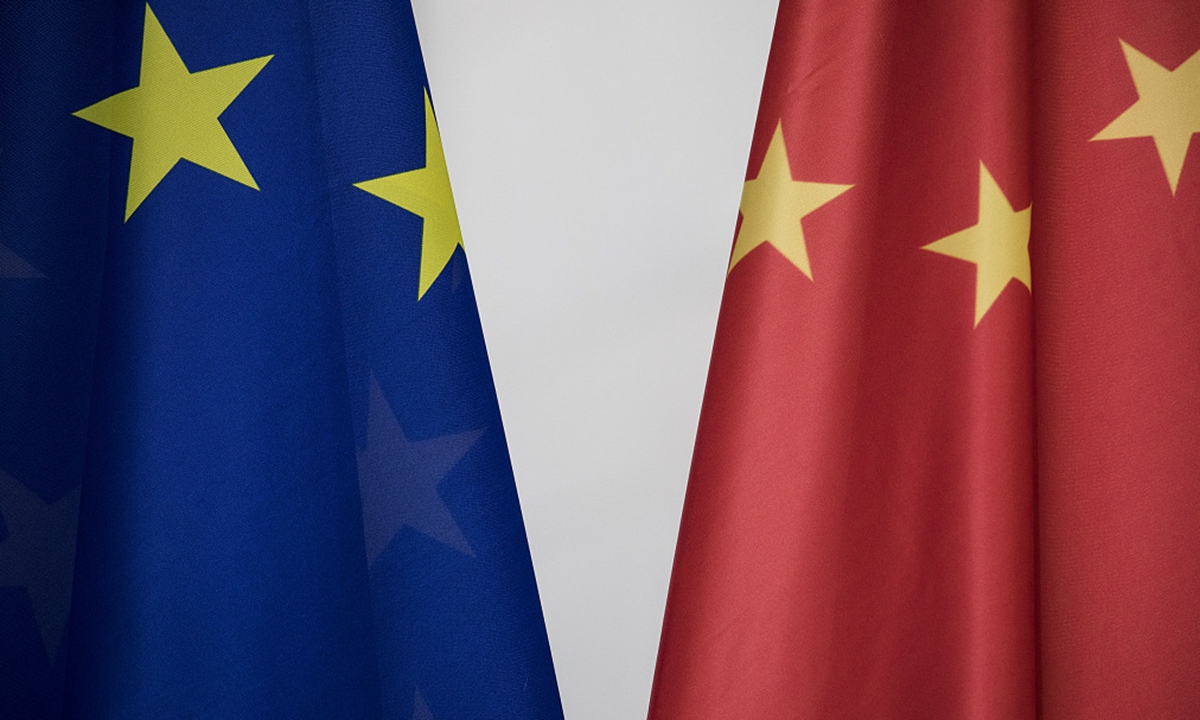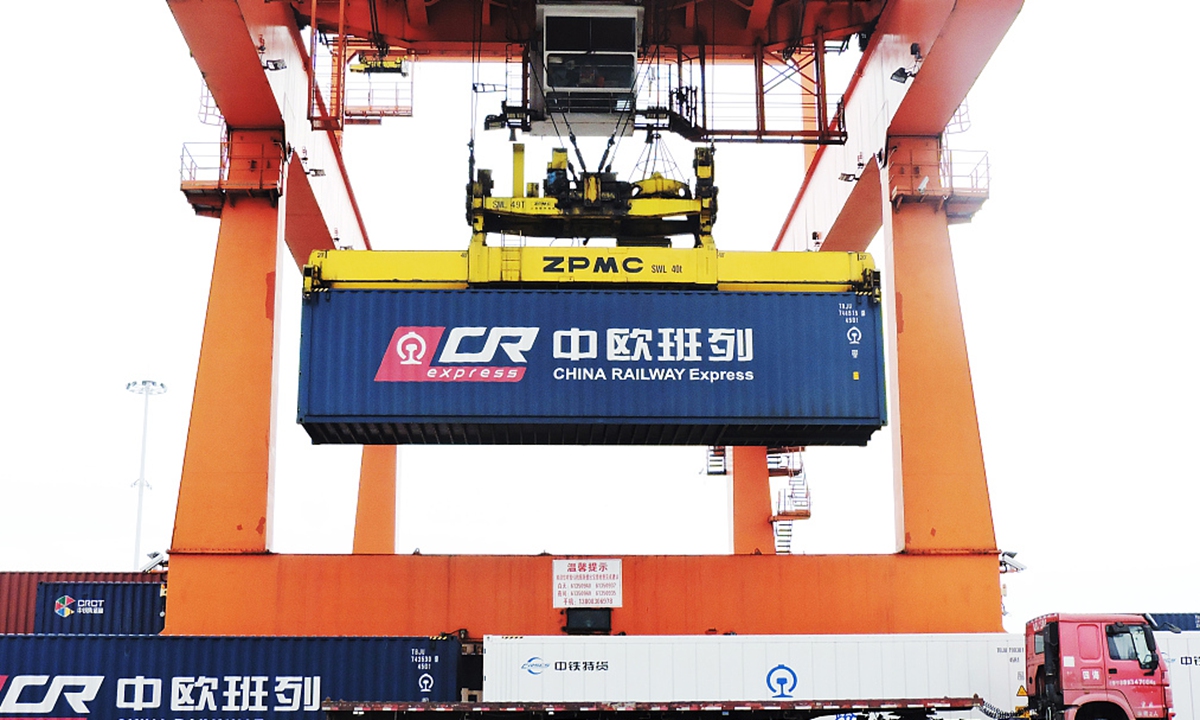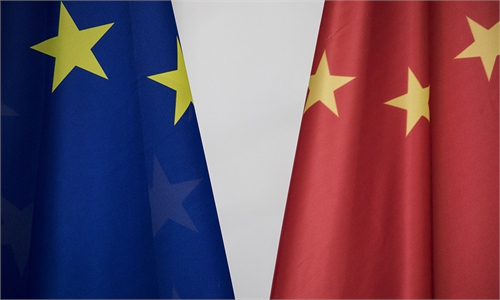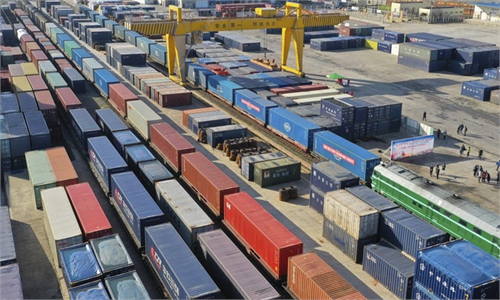China-EU deal expected before year's end, as trilateral game with US intensifies on trade and diplomacy
When Washington can’t meet Brussels’ high expectations, ‘Beijing will get its chance’

China EU Photo:VCG
The 35th round of negotiations for the China-EU investment agreement - a landmark deal closely binding the economic interests of China and Europe - concludes on Friday and is expected to be signed at the end of 2020 before Joe Biden formally takes his oath as US president in January.
The agreement goes full steam ahead at a time when the US and EU are eyeing to patch up trans-Atlantic ties and Biden actively promotes an ideological alliance to counter China's influence with Europe now stepping up its pressure on China over human rights issues and harshly criticizing so-called "Wolf Warrior" diplomacy.
The EU has attached extremely high or even wishful expectations that Biden's administration will return the US as leader of the West, which could impact China-EU ties as Brussels navigates its ties with Beijing and Washington in a trilateral game of trade and diplomacy, said Chinese experts.
The EU is likely to seek common ground with the Biden administration to pressure China on issues like human rights, ideology, Hong Kong and Xinjiang, but China does not want to see the cooperation and consensus it has reached with the EU to be impacted, the experts noted.
Gao Feng, spokesperson of the Ministry of Commerce, said at Thursday's press conference that China and the EU are in the midst of the 35th round of negotiation of the China-EU investment agreement, and both sides are aiming to solve "leftover problems" and realize the goals set by the leaders of the two sides.
However, in a Reuters article published on the same day, EU Ambassador Nicolas Chapuis, said at an energy forum in Beijing that the EU hopes to reach agreement with the new US administration on a policy toward China.
"We need to have a common understanding to say 'no' to bullying and intimidation, coercive diplomacy, 'wolf-warrior' diplomacy," he said, according to Reuters, referring to China's increasingly assertive foreign policy and confident diplomatic style.
Responding to Nicolas Chapuis's "wolf warrior" accusation, China's Foreign Ministry spokesperson Hua Chunying said at Friday's media briefing that it is unfair stigmatization of China's diplomacy to claim that it is "coercion" and "wolf warrior" for China to speak the truth and defend its interests and dignity.
Wang Yiwei, director of the Institute of International Affairs at Renmin University of China, said that it seems like the return of US establishment elites has made some EU officials "too excited" as they can't wait to stand with the US to reach some strategic consensus toward China, but neither side is likely to see trans-Atlantic relations return to the same level they were in the past.
Hyping "the common threat from China" won't help solve key problems and disagreements between the EU and the US, Cui Hongjian, director of the Department of European Studies at the China Institute of International Studies, told the Global Times.
The EU has a long "problem list" for the US after Biden takes office, including trade frictions, digital services tax, carbon tariffs, long-arm jurisdiction, NATO's budget, ties with Turkey and the Iranian nuclear deal, Cui noted.
The top priorities for the new Biden administration will be domestic issues, so the US won't be able to quickly solve problems with the EU, allowing China to increase cooperation with the EU, said Chinese analysts.
"China is prepared for some changes from the EU, but no matter how many differences or frictions occur, we hope trade, investment agreements and other existing cooperation won't be affected," Cui noted.

China EU trade Photo:VCG
Consolidate consensuses
Chinese President Xi Jinping and French President Emmanuel Macron reached important consensus on the next stage of China-France cooperation during a phone conversation on Wednesday evening, the Xinhua News Agency reported.
Wang said the call was a signal that China wants to confirm and consolidate the consensus the two sides can agree on at the moment, and make sure they won't be changed in the future.
Political changes within the EU could mean France will become one of the leading countries within the regional union, so China-France ties would become more significant.
The two heads of state held discussions on bilateral and multilateral cooperation, reaching a number of important consensuses and instructing both countries' relevant departments to step up cooperation in a range of fields including fighting the COVID-19 pandemic, vaccine development, climate change and space exploration.
With independence as its traditional foreign policy virtue, France attaches great importance to developing relations with China, and is ready to work with China to deepen bilateral cooperation and cooperation between the EU and China, Macron said, adding that he hopes the EU-China investment agreement will be reached soon.
Before the phone call with Macron, Xi had a phone conversation with German Chancellor Angela Merkel on November 24 on the EU-China investment deal and strengthening bilateral cooperation.
Analysts pointed out Germany, a heavyweight in the EU, plays an important role in the triangle relations of China, EU and the US.
While upholding a conservative ideology and not giving up differences with China on human rights, Germany is still the most determined leader of an independent Europe.
The EU will benefit more than China by signing the agreement as it would make the Chinese market much more open to the EU, but now "the EU believes that China also desperately wants this agreement as it can make China more secure under pressure and trade frictions with the US," Cui said, adding that a US administration run by establishment elites will return, which could make the EU more assertive in negotiations with China.
"But understanding the demands proposed by the EU is crucial. This depends on how China understands these demands based on its own economic interests and its new idea of 'domestic and international dual circulation.' Some requests from the EU can also serve the opening-up and reform of China, so that agreement is very likely to be signed soon," Cui said.
The long-awaited China-EU investment agreement will be reached "by the end of the year," Chinese Ambassador to the European Union Zhang Ming told the media in November.
Huang Renwei, executive vice dean of the Fudan Institute of Belt and Road & Global Governance, said at the Global Times Annual Forum on December 5 that elites in the Biden's team will shift competition with China from "hard power" to "soft power."
The US together with its allies could launch an ideological offensive against China and the Beijing Winter Olympics could be a target.
China is preparing for potential conflict with the US through diplomatic efforts, said Chinese experts, noting that ensuring Europe doesn't follow US' hostility toward China is a crucial task, and if France and the EU maintain their traditional foreign policy independence, China-EU ties will remain stable no matter what the US does.
Find the correct position
The EU is now in an advantageous position in the trilateral game involving China and the US, and the extent the EU is able to maintain its independence will determine how much it has to lose in the game, said Chinese analysts.
The EU wants to use "the common challenge from China" to coerce the US to "return to multilateral system and be a leader again," and the US will be reluctant to satisfy the EU on everything, so playing "the China card" with the US can justify the EU's demands on China, Cui said. in the front of the US, so that the NATO can be sustained with more excuses and motivations
Wang said the EU will understand that China is the biggest and the most stable market in the world amid the COVID-19 pandemic and the post-pandemic era, so it won't be fooled or used by the US and become extremely hostile toward China.
Cui said the incoming Biden administration and US establishment elites are promising the EU that Trump's harming of trans-Atlantic ties won't return but few believe such a promise.
Sooner or later, the EU will understand that multilateralism proposed by the Biden administration is actually "multilateralism under the leadership of the US," and if the US can't lead the entire system, the US will return to unilateralism, Wang said, adding that "the multilateralism proposed by China is real and closer to the one in the heart of the EU."



